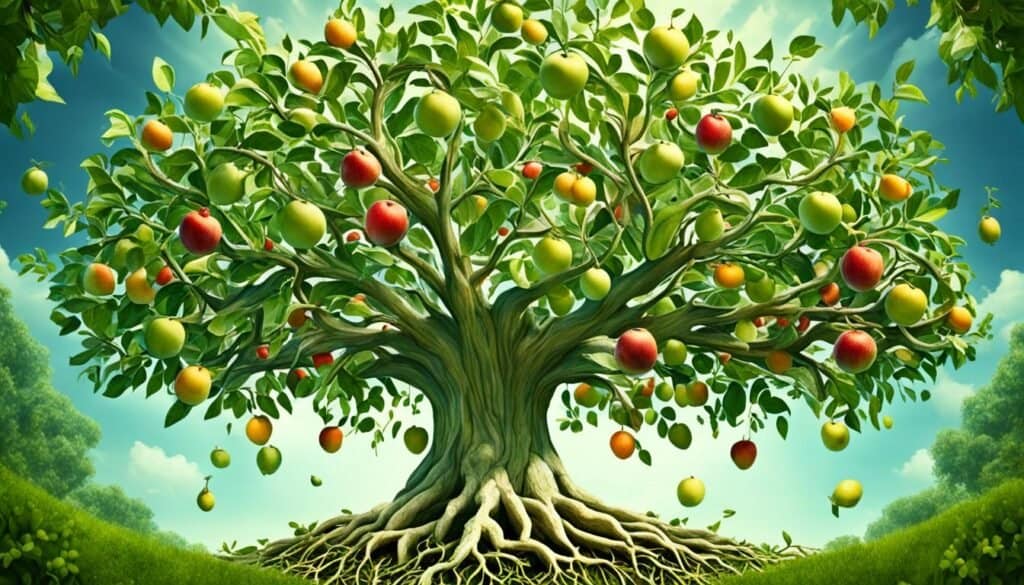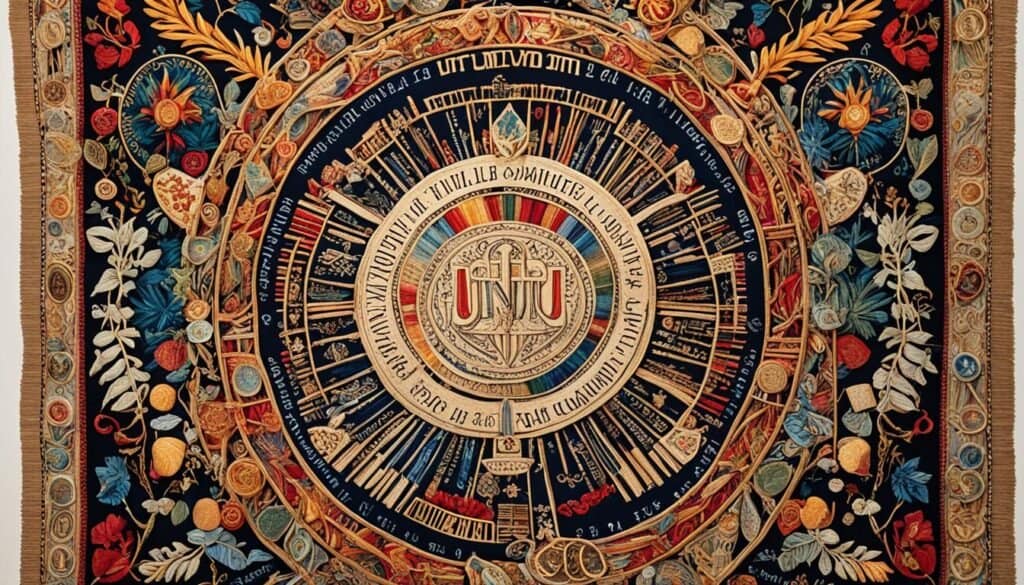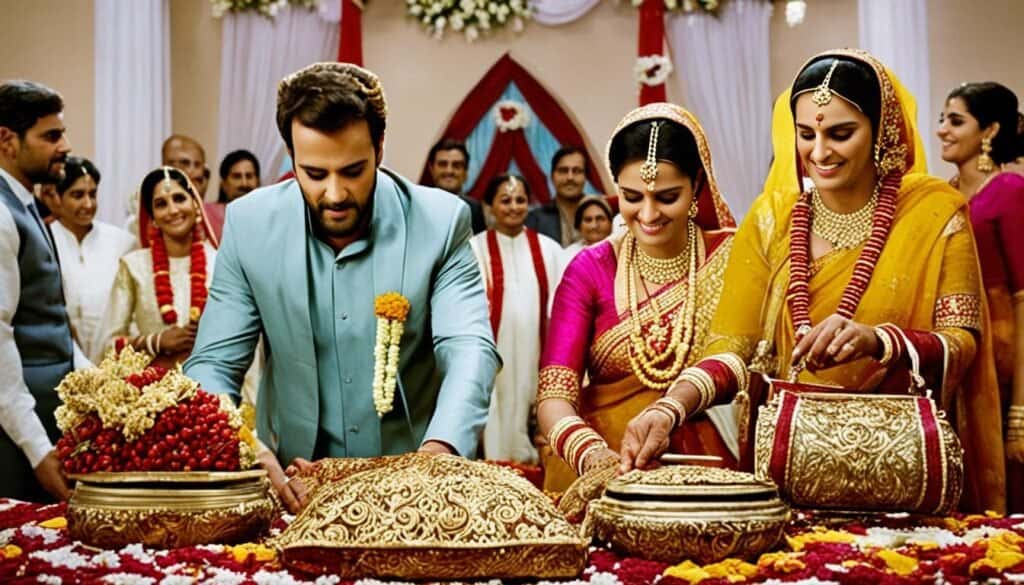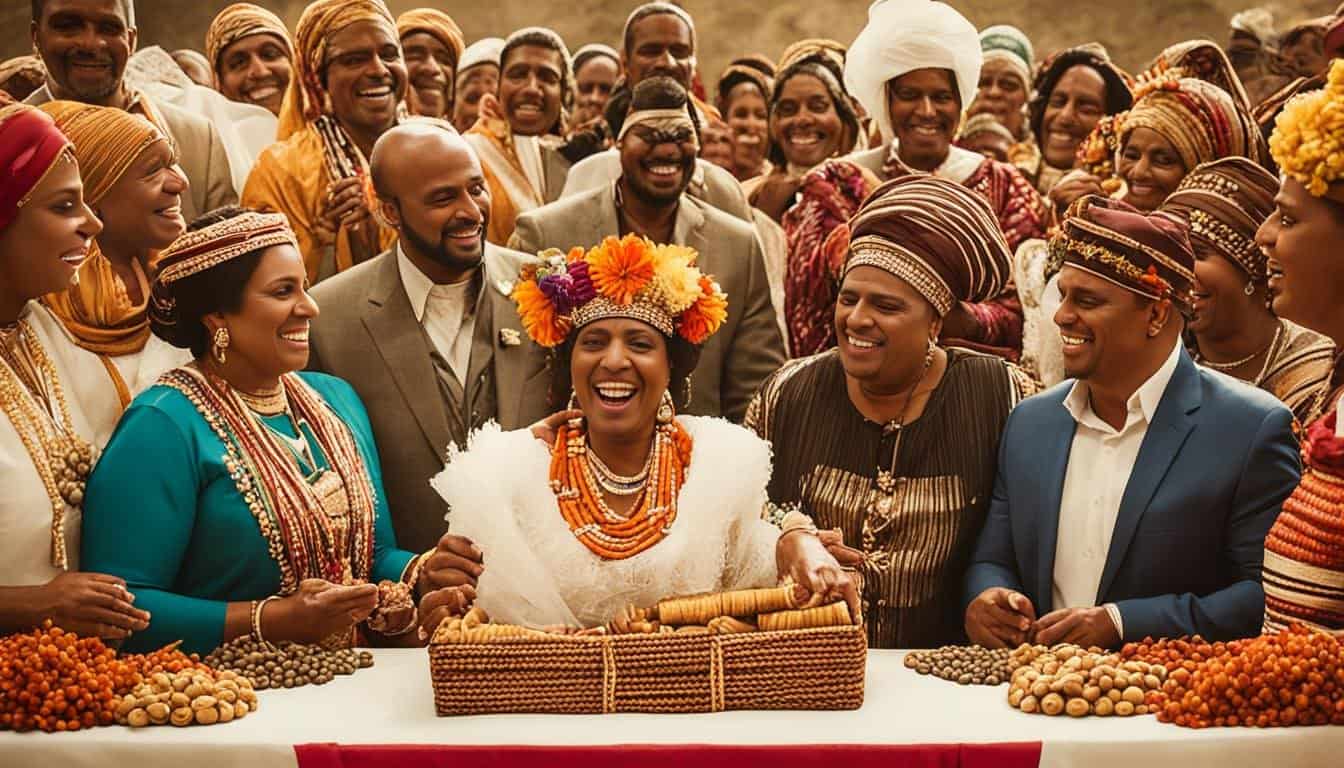Ever thought about the start of marriage customs? What’s their meaning and how they began? The book of Genesis tells us a lot about marriage’s beginnings. Let’s dive into the 10 traditions and customs from Genesis. We’ll see what they say about early society’s ideas and values.
Key Takeaways:
- The book of Genesis sees marriage as a holy, divine union. It’s part of God’s grand plan for people.
- Monogamy is lifted up as the best way to marry. It started with Adam and Eve’s union.
- Fathers have a big part in the ceremonies. They show the old way of giving away their daughter, handing over their care.
- There’s talk about bride prices or dowries. This points to the sharing of wealth between families.
- Making babies is seen as really important. It shows how important it was to keep family lines going.
The Divine Institution of Marriage in Genesis
Marriage is a divine institution set forth in Genesis, showing God’s design for us. In Genesis 2:18, God brings the woman to the man, showing the importance of the union. This illustrates how marriage is part of God’s intentional plan for us.
As Genesis depicts, marriage is sacred. It’s not just a human concept; it’s God’s way of creating companionship, support, and deep bonds. In this sacred bond, people find love, togetherness, and a clear meaning in life.
The chapter in Genesis describes marriage’s distinct purpose in human relationships. It provides a space for genuine love, faithfulness, and dedication. The marriage between a man and a woman mirrors the special bond between Christ and his followers, showcasing the love and commitment of God.
Key Takeaways:
- Marriage is a divine institution created in Genesis.
- God’s direct involvement highlights its sacredness.
- Marriage is central to God’s plan, giving us companionship and support.
- This bond reflects the close relationship between Christ and his followers.
Let’s keep exploring the significant marriage traditions in Genesis. There’s much wisdom and insight to be gained from this divine institution.
Monogamy as the Ideal in Genesis
In Genesis, we find stories of polygamy. However, monogamy is seen as the ideal. The story of Adam and Eve outlines what marriage means in the Bible.
Adam and Eve: The First One Flesh Union
Understanding monogamy in Genesis starts with Adam and Eve. Genesis 2:24 says, “Therefore a man shall leave his father and his mother and be joined to his wife, and they shall become one flesh.” This emphasizes the unbreakable bond between a man and a woman.
God meant for marriage to be special and between just two people. The term “one flesh” shows how close a husband and wife should be.
“For this reason a man shall leave his father and his mother, and be joined to his wife; and they shall become one flesh.” – Genesis 2:24
This “one flesh” idea is key to understanding the monogamy ideal.
The Significance of Monogamy
Genesis highlights monogamy to mean a marriage of exclusivity, commitment, and unity. It promotes trust, happiness, and peace for both partners.
In Genesis, marriage is a life-long pact grounded on love and trust. It builds a strong base for a close and supportive partnership.
Though polygamy is in Genesis too, it leads to many problems. These issues show why the Bible values monogamy.
The image below visually represents the monogamous bond between Adam and Eve and symbolizes the commitment and unity that characterize monogamous marriages in the biblical context.
| Monogamy as the Ideal in Genesis | Key Points |
|---|---|
| The union of Adam and Eve establishes the ideal of monogamy in Genesis. | 1. The first “one flesh” union 2. Indivisible and exclusive bond between one man and one woman 3. Significance of emotional and physical fidelity |
| Monogamy contributes to the stability, well-being, and happiness of individuals. | 1. The framework for a strong and enduring relationship 2. Emphasis on love, trust, and mutual respect 3. Contrast with the challenges associated with polygamous relationships |
The Father’s Role in the Bride’s Handing Over
In Genesis 24, a key story shows the traditional father’s role in marriage. Here, Abraham’s servant is a main character. He works hard to find a good wife for Abraham’s son, Isaac.
Abraham tells his servant to go back to their homeland for Isaac’s wife. He stresses choosing from their own people, not the locals. This is so Isaac’s wife will share their faith and culture.
The servant travels to Nahor and prays for a sign to identify the right woman. He asks for a woman who will show kindness by not only giving him water but also his animals.
Rebekah, the granddaughter of Nahor, shows up and does just that. She’s the chosen one as she fulfills the sign. The servant then gives her jewelry and asks her family to marry her to Isaac.

“So they sent away Rebekah their sister and her nurse, and Abraham’s servant and his men. And they blessed Rebekah and said to her, ‘Our sister, may you become thousands of ten thousands, and may your offspring possess the gate of those who hate him!’”
This part highlights Rebekah’s blessing and her leaving home. It shows her family giving her over to the servant, marking the start of her new family life. Her father plays a significant role, making sure she’s in good hands.
The story in Genesis 24 is about marriage customs back then. It shows the father’s duty in picking the groom with full trust in his choice of the servant. This reflects the traditions and expectations of their time.
The tale underscores the value of family bonds and aligning with one’s cultural roots through marriage. It teaches about the significance of a father’s role in marriage. This story is a valuable part of the Bible, offering a view on marriage traditions.
| Key Points | Genesis | Abraham’s Servant | Representative |
|---|---|---|---|
| Role in Bride’s Handing Over | Emphasized | Central | Significant |
| Familial Blessing | Present | Not mentioned | – |
| Symbolic Handing Over | Highlighted | – | Emphasized |
| Trust and Confidence | Depicted | Conveyed | Showcased |
Bride Price or Dowry in Genesis
In the book of Genesis, it talks about exchanging wealth when people marry. This is called the bride price or dowry. It involves the groom or his family giving valuable things to the bride’s family. This way, the marriage gets a strong economic foundation and brings the two families closer.
“Jacob had fallen in love with Rachel and said, ‘I’ll work for you seven years in return for your younger daughter Rachel.’ Laban said, ‘It’s better that I give her to you than to some other man. Stay here with me.’ So Jacob worked seven years to pay for Rachel. But his love for her was so strong that it seemed to him only a few days.” – Genesis 29:18-20
Jacob’s story with Laban shows this well. He wanted Rachel as his wife and agreed to work seven years for her. It was like paying a bride price with his hard work. This shows how important this tradition was back then.
In Genesis, such practices show the culture’s focus on wealth sharing during marriages. It wasn’t just tradition, but it ensured the newlyweds started off on a stable financial ground. This made their union more secure.
Examples of Bride Price or Dowry in Genesis
| Biblical Characters | Exchange of Wealth |
|---|---|
| Laban and Jacob (Genesis 29) | Jacob works for seven years to “pay” for Rachel and Leah |
| Shechem and Dinah (Genesis 34) | Shechem offers to pay any price for Dinah’s hand in marriage |
| Othniel and Achsah (Joshua 15) | Othniel conquers a city and receives Achsah as a wife and land as a dowry |
These examples from Genesis show how the bride price or dowry meant financial safety in those marriages. They also tell us about the culture and economy of marrying at that time.
The Importance of Offspring in Genesis
In the book of Genesis, God told humans to “be fruitful and multiply.” This shows how important having kids and starting a family is.
Throughout Genesis, the idea to have kids is linked to keeping the family going. It plays a key part in God’s plan for people.
God told the first humans, Adam and Eve, to have children. This started the idea that having kids is important for all marriages.
Having kids means fulfilling your wish for a family. But it also helps grow God’s family here on Earth.
Genesis often shows us how important having children is. For example, when Isaac was born to Abraham and Sarah, it fulfilled God’s word and carried on their family’s path.
In Genesis 15:5, God promised Abraham as many offspring as there are stars. This shows how key kids are in God’s promise to Abraham.
Jacob and his twelve sons are another example. They went on to become the twelve tribes of Israel. Their story shows how children are vital in continuing God’s plans.
Genesis makes it clear. Having children is part of God’s big plan. It’s about keeping life going and bringing in the future God hopes for.
Now, check out this table to see more about how important kids are in Genesis:
| Story | Significance of Offspring |
|---|---|
| Adam and Eve | Started human life and the need to have children. |
| Abraham and Sarah | God’s promise to bless them with many kids, starting the chosen people. |
| Jacob and His Sons | The start of the 12 tribes of Israel and carrying on God’s covenants. |
This table clearly shows how kids are central in Genesis. They keep the story going, connecting generations as part of God’s plan.

To wrap it up, God’s call to have kids is a key theme in Genesis. It’s not just about starting a family. It’s about ensuring the future of God’s people. The stories in Genesis underline the vital role children play in God’s plans.
Marriage Alliances in Genesis
Marriages in Genesis go beyond two people coming together. They show how families and tribes join through marriage. This demonstrates the deep value of marriage for more than just love and support.
A clear example is seen in Abraham and Isaac’s story. Abraham, a well-known figure, sets his son Isaac to marry Rebekah, from his clan. This marriage ensures Abraham’s line continues. It also strengthens the bond between their families.
Families and tribes made these alliances to protect their interests and gain resources. Often, these marriages had political or economic aims. They helped keep things stable and safe for all involved.
Abraham’s choice to pair Isaac with Rebekah aimed to unite his whole family. This marriage built a stronger connection among his kin and his wider family group.
“Marriage alliances were a common practice in ancient times, serving as a means to form strategic partnerships and establish social cohesion within communities.”
Marriage alliances in Genesis show how families and tribes depend on each other. These unions are not just about love. They are shaped by social, cultural, and political needs too.
Key Takeaways:
- Marriages in Genesis often served to solidify alliances between families and tribes.
- Abraham’s arrangement of Isaac’s marriage with Rebekah exemplifies the practice of marriage alliances.
- Marriage alliances were driven by political, economic, and social considerations.
- These alliances helped maintain stability and protection for the parties involved.
- Marriage alliances showcased the interconnectedness and interdependence of families and tribes in ancient times.
Marriage alliances were very important in Genesis. They show marriage as a strategic move to strengthen ties and alliances. This leads to a more interconnected community.

Servant Marriages in Genesis
In the book of Genesis, we see examples of servant marriages. One famous case is the union between Abraham and Hagar.
Abraham was known for his strong faith. He was willing to enter into these unique kinds of marriages. This shows that not all marriages were the same back then. People like Abraham sometimes had marriages that went against what was considered usual.
“And Sarah said to Abram, ‘The Lord has prevented me from bearing children. Go in to my servant; it may be that I shall obtain children by her.'” (Genesis 16:2)
This example from Genesis 16:2 shows how Sarah proposed a way to have children through her servant Hagar. This may seem unusual today. But in their time, it was a way to follow a cultural expectation to have children.
Such stories in the Bible show that rules about marriage could be different. They adapted to the needs and beliefs of those involved.
Abraham and Hagar’s Marriage

The story of Abraham and Hagar is a unique one. They faced a fertility challenge. Sarah, Abraham’s wife, took an initiative to solve it. She offered Hagar as a way to bear children for her husband.
Unlike today, their solution was widely accepted then. It kept the marriage line going as God had directed.
| Benefits of Servant Marriages in Genesis | Challenges of Servant Marriages in Genesis |
|---|---|
|
|
The marriage between Abraham and Hagar offers insight into ancient marriage practices. They found ways to address social challenges within their cultural norms.
For more on unique marriages in Genesis, keep reading.
Levirate Marriage and Kinship Restrictions in Genesis
In the book of Genesis, we learn about marriage customs from ancient times. One was levirate marriage. This custom required a man to marry his brother’s widow. It aimed to keep the husband’s family line going and to care for his widow.
It was used when a husband died without children. Then, it was up to his brother to marry the widow. Any child they had was seen as the deceased’s own. This kept the family name and property within the family. Tamar’s story tells of such a marriage, ensuring the family line continued (Genesis 38:6-11).
Levirate marriage was about more than just continuing a family’s line. It showed how much ancient societies valued family and legacy. Since having no heirs was seen as a tragedy, this practice was a duty to the deceased. It also kept family ties strong.
In Genesis, we also see warnings about marrying too closely related. Rebekah didn’t want Jacob to marry outside their group. This was to protect their beliefs and customs. It underlines the need to marry within certain limits to maintain family and cultural identity.
“Marriages within close blood relations were generally discouraged as they had the potential to compromise the integrity of the family lineage and kinship network.”
To sum up, in Genesis, levirate marriage shows the importance of family and duty. It taught then, as it does now, the value of caring for one’s family and carrying on its traditions. The story also warns against marrying too closely, pointing out how it could harm the family’s integrity.
How Do Acts of Hospitality in Genesis Influence Marriage Traditions and Customs?
Acts of kindness in genesis set a foundational precedent for hospitality in marriage traditions. These early examples exemplify the importance of welcoming and nurturing relationships. They emphasize that marriages rooted in kindness and generosity cultivate strong bonds, influencing customs that celebrate communal support and the joyous gathering of families.
Symbolic Gestures in Marriage Traditions
In the book of Genesis, there are many symbolic gestures tied to marriage. These actions show us a lot about the traditions of that era. For example, taking off a sandal shows a shift in authority or possession during marriage talks. It is a serious step that marks a new commitment.
Covering the head is another custom we see in Genesis. This usually stands for respect and being willing to submit. In marriage, it might symbolize moving from a woman’s father’s home to her new home with her husband. It shows the strong bond and loyalty between them.
These practices highlight the importance of showing the sacredness of marriage through visible actions. They act as constant reminders of the promises and duties spouses have toward each other. Although these gestures are not common today, they tell us about the valued traditions of marriage in ancient times.
Affiliate Disclosure: "As an Amazon Associate I earn from qualifying purchases made from links in this post. We are a participant in the Amazon Services LLC Associates Program, an affiliate advertising program designed to provide a means for us to earn fees by linking to Amazon.com."

